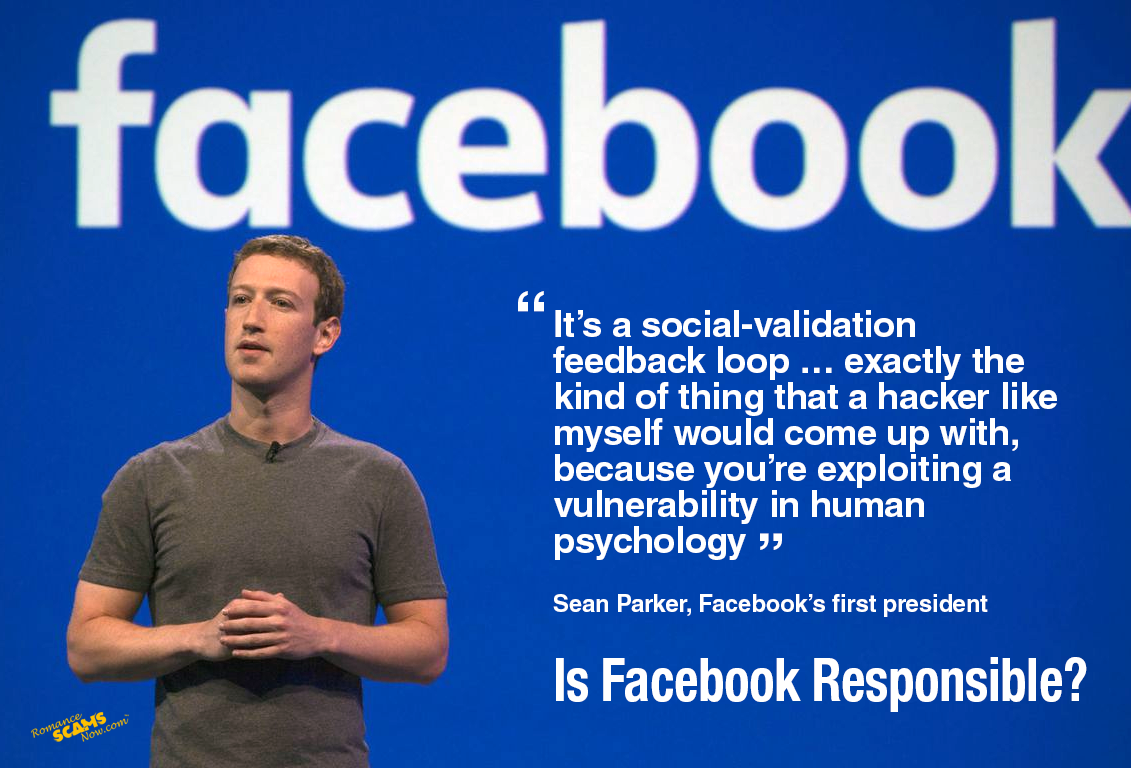EDITORIAL – IS FACEBOOK RESPONSIBLE FOR YOU BEING SCAMMED?
Most people don’t need to be told they’re addicted to technology and social media.
EDITORIAL – ¿SE RESPONSABILIZA FACEBOOK POR SER ESCAMIFICADO?
La mayoría de las personas no necesitan que se les diga que son adictos a la tecnología y las redes sociales.
Si buscar su teléfono celular a primera hora de la mañana no le dice tanto, lo harán múltiples estudios científicos y libros. Ahora las personas responsables de esta adicción moderna han admitido que ese era su plan desde el principio.
En los últimos días hemos visto varios artículos sobre esto, pero ¿han pensado en cómo esto se aplica a ser víctima de los estafadores romances?
Sean Parker de Silicon Valley, el primer presidente de Facebook, ha estado diciéndole a cualquiera que escuchará en entrevistas que el servicio de Social Media “literalmente cambia su relación con la sociedad” y “probablemente interfiera con la productividad de maneras extrañas”. Y añadió: “Dios solo sabe lo que le está haciendo al cerebro de nuestros hijos “.
El objetivo principal de Facebook sigue siendo atraer y mantener la atención de la gente, dijo Parker. “El proceso de pensamiento que se dedicó a la creación de estas aplicaciones, siendo Facebook el primero de ellos, … se trataba de: ‘¿Cómo consumimos tanto tiempo y atención consciente como sea posible?'”.
La atención, dijo, fue impulsada por “un pequeño golpe de dopamina de vez en cuando”, en la forma de un me gusta o un comentario, que generaría más contenido, en forma de más me gusta y comentarios.
Esto confirma lo que SCARS y otros sabían desde hace tiempo, que las estafas romances son, de hecho, una forma de adición.
“Es un ciclo de retroalimentación de validación social … exactamente el tipo de cosa que un pirata informático como yo se nos ocurre, porque estás explotando una vulnerabilidad en la psicología humana”.
Parker dijo que los inventores de las plataformas de redes sociales, incluido él mismo, Mark Zuckerberg de Facebook y Kevin Systrom de Instagram, “entendieron conscientemente” lo que estaban haciendo. “Y lo hicimos de todos modos”.
Los estafadores solo lo entendieron mal, pero están bien adaptados para explotarlo.
Una parte importante del modo scammer es mantener conectada a la víctima y la adicción a lo que proporciona la relación (falsa), la “mirada de validación”, que la víctima es deseable, amada y digna de las atenciones de otra persona de todo el mundo. mundo. Es ese elemento “Te entiendo” que se convierte en el núcleo de la adicción que esto causa y los estafadores explotan devotamente en sus víctimas.
No solo es una revelación, sino que también puede ser la ruina final de Facebook el hecho de que conocían el poder de su plataforma para convertir a sus suscriptores en adictos, pero también puede ser la última responsabilidad en su negligencia contributiva al someter a sus suscriptores a los cientos de millones de perfiles falsos (scammer) que pueden explotar esto. En todos los sentidos, esto es equivalente a un efecto secundario de un fármaco malo, y esperamos ver numerosas demandas colectivas.
Nuestra organización está lista para apoyar cualquier acción de clase que pueda estar surgiendo. Simplemente va a mostrar, tenga cuidado con lo que construye y las consecuencias imprevistas que resultan, excepto en este caso no fue imprevisto en que fue diseñado.
Dr. Tim McGuinness,
Presidente y Fundador,
Sociedad de Ciudadanos Contra Estafas Románicas [SCARS]
www.AgainstScams.org
Miami Florida EE. UU.
info@RomanceScamsNow.com



I would like to report Sanders Richard. Claims to be 52. Wants money sent to Ghana for for his son. I’ve sent 140.o
00Western Union. I also sent him an LG phone that he wants 200 to unlock it and he wants me to send his son money for Xmas. I have pictures if you want them.
Then why didn’t you report him? This is not the way to do it. You will find our reporting forms in our menus.
Yes your so toght
Zurkerbooger is a billionare. Why not make him pay.